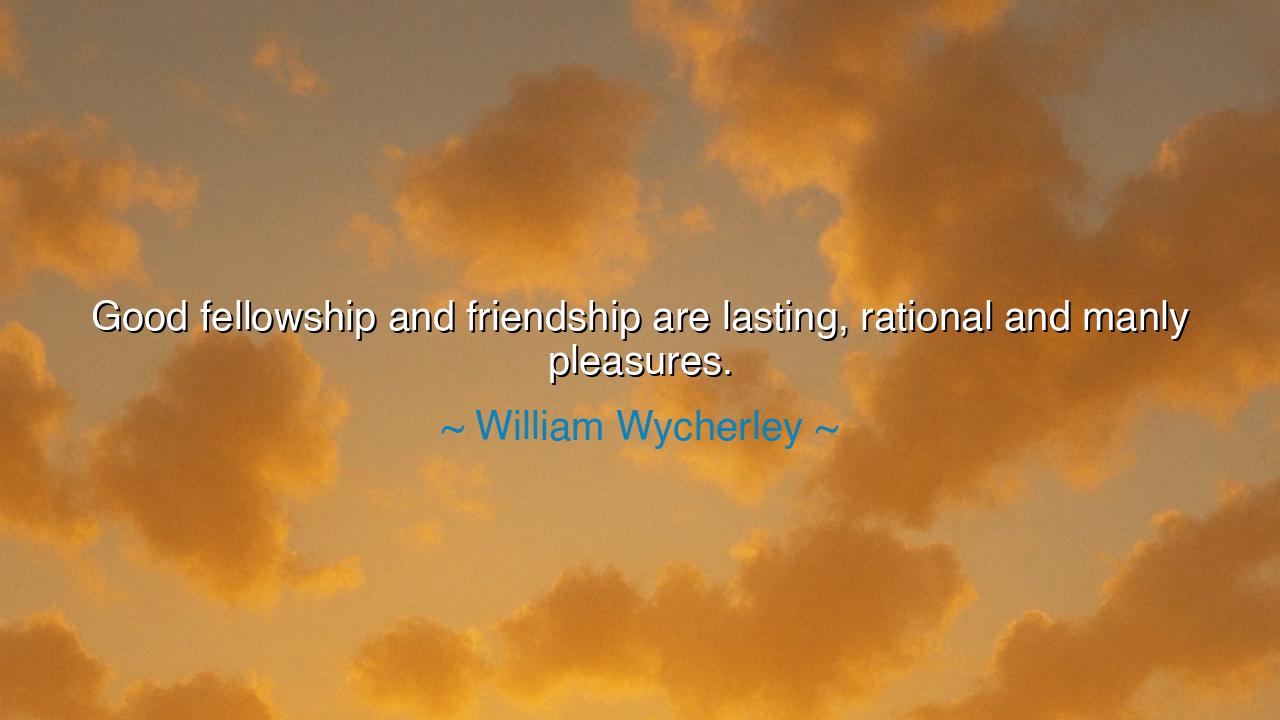
Good fellowship and friendship are lasting, rational and manly






“Good fellowship and friendship are lasting, rational and manly pleasures.” Thus spoke William Wycherley, the English dramatist of the seventeenth century, a man who knew both the follies and the virtues of human nature. In an age of wit, intrigue, and worldly excess, his words ring like a call to balance—to seek joy not in fleeting indulgence but in the enduring grace of friendship. Beneath the elegance of his phrasing lies a truth as old as civilization: that while passions fade and riches vanish, fellowship—the companionship of noble hearts—brings a happiness that endures, steady as the flame of reason and deep as the soul’s longing for kinship.
The origin of this saying reflects Wycherley’s life amid the glittering but often hollow society of Restoration England. He lived among courtiers and poets, where pleasure was sought in excess and conversation sparkled with wit but seldom with sincerity. Yet Wycherley, though a man of the world, saw through the emptiness of such pursuits. He recognized that true joy comes not from revelry or vanity but from good fellowship, the kind born of mutual respect, trust, and understanding. To him, the laughter of honest friends around a humble table was a richer delight than the applause of crowds or the praise of kings. His words carry both wisdom and warning—to seek pleasures that are rational and lasting, not those that consume us for a moment and leave us poorer in spirit.
In speaking of “manly pleasures,” Wycherley does not mean those exclusive to men, but those virtues that the ancients—Greeks and Romans alike—called virtuous or noble. To him, manliness signified strength of character, constancy, integrity, and courage. Good fellowship requires these same qualities. For friendship is not the indulgence of the weak but the strength of the wise. It demands loyalty, patience, and the ability to rise above pride and selfishness. It is, in truth, a rational pleasure, for it engages both heart and mind—it gives joy without folly, excitement without regret, and fulfillment without excess.
History itself gives us luminous examples of this kind of friendship. Consider the bond between Cicero and Atticus, two men separated by temperament but united by intellect and affection. Cicero, the statesman and orator, often found himself exiled, scorned, or betrayed. Yet in every dark hour, Atticus remained steadfast—offering counsel without flattery, comfort without pity. Their letters, preserved through centuries, reveal the strength of rational friendship, one that blended affection with wisdom, loyalty with understanding. It was a pleasure not of the senses, but of the soul—a lasting bond that neither politics nor time could break.
Such friendships, Wycherley reminds us, are not accidental; they are the reward of virtue. The frivolous may find company, but only the virtuous find companionship. The crowd may cheer us in success, but only true friends stand beside us in silence when the world turns cold. To cultivate good fellowship is therefore to cultivate the best in ourselves—to be generous, truthful, and steadfast. For the measure of friendship is not in how often we laugh together, but in how deeply we understand and sustain each other when laughter fades.
Wycherley’s phrase “rational pleasure” is itself a philosophy. In an age—and indeed, in our own—where pleasure is often pursued without thought, he calls us to moderation and wisdom. Friendship, unlike indulgence, does not dull the mind or corrupt the heart; it refines them. It teaches empathy, patience, and humility. It elevates pleasure from the body to the spirit, from the fleeting to the eternal. Such pleasure is lasting because it nourishes the soul rather than exhausting it. It is the joy of sharing truth, of exchanging ideas, of standing shoulder to shoulder in loyalty and respect.
Let this, then, be the lesson we draw from Wycherley’s wisdom: seek not the hollow laughter of the crowd, but the quiet strength of companionship. Do not waste your heart on those who entertain you, but on those who uplift you. Choose friends not for their flattery but for their fidelity; not for their presence in revelry but for their steadiness in hardship. Cultivate fellowship through honesty, humility, and kindness. For these are the pleasures that do not fade with youth or fortune—they are the treasures of character, the companions of peace, and the pillars of a life well-lived.
So remember, as the ancients did and as Wycherley himself affirmed: true friendship is a gift of both joy and wisdom. It is the pleasure that ennobles rather than enslaves, that calms rather than consumes. It is the fire that warms without burning—the manly, rational, and lasting pleasure that outlives wealth, beauty, and fame. Cherish it, and you will find that even in solitude, you are never alone—for the heart that has known good fellowship carries within it the strength and serenity of the eternal.






AAdministratorAdministrator
Welcome, honored guests. Please leave a comment, we will respond soon